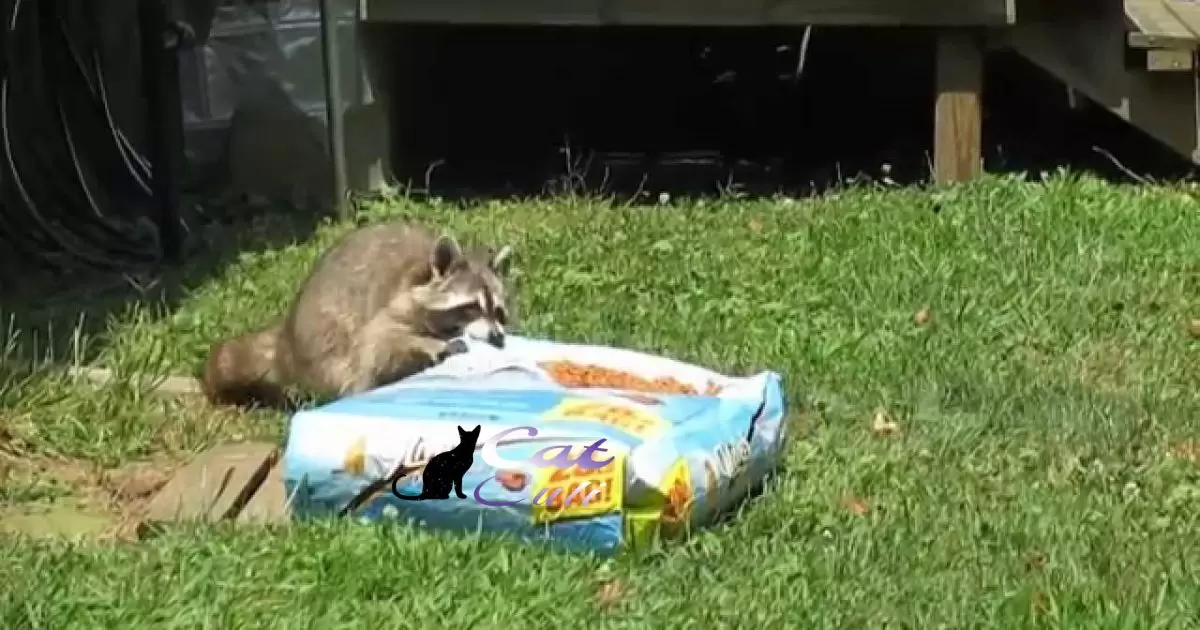Cat food is not ideal for raccoons. Raccoons need a diverse diet that cat food doesn’t provide. It lacks essential nutrients like fruits, insects, and vegetables crucial for their well-being. Feeding raccoons proper, species-appropriate food ensures they get the nutrition they require for a healthy life.
Ever wondered, Is Cat Food Bad For Raccoons? The answer might surprise you. While cat food may seem like a convenient option, it falls short of meeting the nutritional needs of our masked friends. Let’s explore why cat food may not be the best choice for raccoons and discover what they truly need for a healthy and thriving life.
Stay with us to uncover why cat food might not be the best choice for these clever critters. Discover the essential nutrients raccoons need and why providing them with the right diet is crucial for their overall well-being. Stay tuned for insights into keeping our masked friends happy and healthy.
A Raccoon Keeps Stealing Our Outside Cat Food
Our outside cat food is disappearing, and the culprit is a persistent raccoon. This sneaky critter keeps raiding the cat’s food bowl, leaving us puzzled and a bit frustrated. We need to find a solution to keep the raccoon at bay and ensure our cat gets the nourishment it needs without sharing its meals with the masked visitor.
To deter the raccoon, we might consider securing the cat food in a sealed container or bringing it inside during the night. It’s essential to find a balance that allows our cat to eat undisturbed while keeping the persistent raccoon from turning our yard into its nightly feast.
The 7 Ways To Keep Raccoons Out Of Cat Food
Discovering effective ways to keep raccoons away from cat food is crucial. One method involves using secure lids on outdoor feeding stations. Placing feeding stations on elevated surfaces and ensuring they are well-lit can also deter raccoons from accessing cat food.
Another tip is to establish a consistent feeding schedule for your cat. This reduces the chances of leaving food out overnight, decreasing the likelihood of attracting raccoons. Employing motion-activated lights or sprinklers in the feeding area can provide an additional layer of deterrence, helping to maintain a raccoon-free zone for your feline friend.
Relationship Between Cats And Raccoons
Cats and raccoons often share an intriguing relationship in urban and suburban areas. Cats, being territorial, may view raccoons as potential intruders, leading to occasional standoffs or chases. Some instances showcase a more harmonious coexistence, with both animals ignoring each other or even sharing common spaces.
Understanding and observing the dynamics between cats and raccoons can provide insights into the fascinating interplay of wildlife in our everyday environments.In certain scenarios, cats and raccoons may even engage in playful interactions, demonstrating a surprising level of tolerance and adaptability.
It’s a reminder of the complex and dynamic relationships that can develop between different species sharing the same habitat. Observing these interactions sheds light on the ways in which animals navigate and coexist in the ever-changing landscapes of our urban and suburban environments.
Do Raccoons And Cats Get Along?
Raccoons and cats often don’t get along due to differences in their territorial behaviours. Raccoons are naturally more solitary and can view cats as intruders, leading to potential conflicts.
Cats, being territorial as well, may feel threatened by raccoons, resulting in skirmishes. It’s advisable to monitor their interactions and provide separate spaces to avoid clashes between these two independent and territorial animals.Introducing raccoons and cats requires careful supervision and a gradual approach.
Giving each animal its own space and ensuring they have separate feeding areas can help minimize potential conflicts. Understanding their instincts and behaviours is crucial to fostering a peaceful coexistence between raccoons and cats in shared environments.
Would A Raccoon Attack Your Cat?
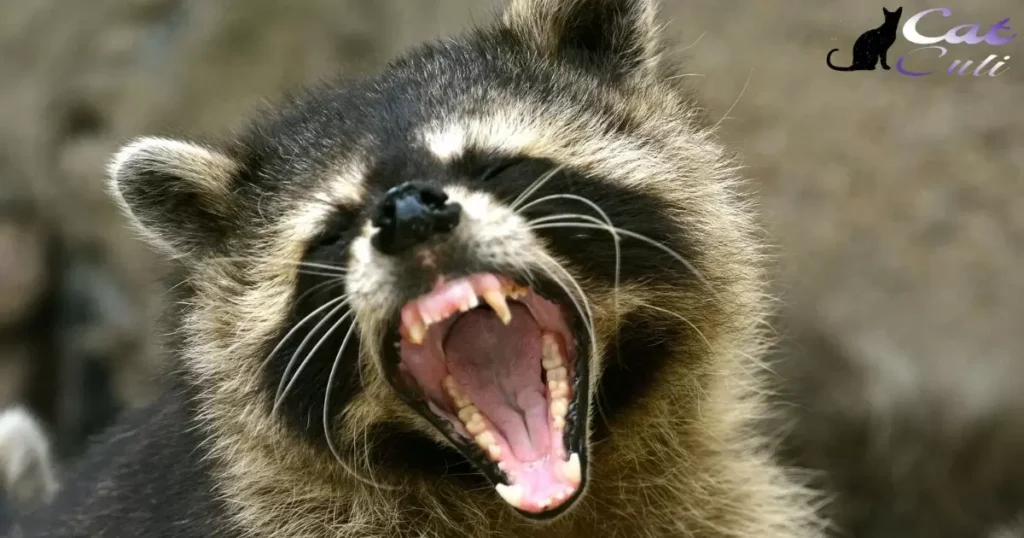
Concerned about whether a raccoon might attack your cat? While it’s rare, interactions can occur. Raccoons are generally more interested in food than confrontation. To minimize risks, secure pet food, and avoid leaving your cat unattended outside, especially during the night.
Vigilance and a few precautions can help create a safer environment for both your cat and any curious raccoons.Understanding raccoon behaviour is key. They’re opportunistic foragers, but attacks on cats are infrequent.
Ensure your cat’s safety by keeping them indoors at night and securing any potential food sources. By taking these simple steps, you can promote harmony between your cat and the local raccoon population.
Can Cats And Raccoons Share Diseases?
Yes, they can. Both animals can transmit diseases to each other through close contact or shared environments. It’s important to monitor their interactions, especially if they share outdoor spaces.
Regular veterinary check-ups and preventive measures can help ensure the health and well-being of both cats and raccoons, minimizing the risk of disease transmission between them.
Avoiding direct contact between cats and raccoons and keeping food sources separate can further reduce the chances of disease spread. By being proactive and mindful of their interactions, pet owners and wildlife enthusiasts can contribute to the overall health and safety of these animals.
How To Keep Raccoons Out Of Cat Food: 7 Effective Tips
- Place cat food bowls indoors during nighttime to avoid attracting raccoons.
- Use weighted or covered food bowls to make it difficult for raccoons to access the food.
- Install motion-activated lights near feeding areas to deter raccoons.
- Secure trash cans tightly to prevent raccoons from rummaging for food scraps.
- Avoid leaving excess cat food outdoors, especially overnight.
- Consider using elevated feeding stations that are challenging for raccoons to reach.
- Employ natural deterrents like citrus peels or pepper around feeding areas to discourage raccoons.
Do Raccoons Eat Cat Food?
Raccoons are known to eat cat food when available. They are opportunistic feeders and won’t hesitate to indulge in cat kibble left outdoors. It’s important to secure pet food containers to prevent attracting raccoons, as their dietary needs differ, and a consistent diet of cat food may not provide the essential nutrients for their health.
Consider storing pet food indoors to avoid unintentionally inviting these clever foragers to the dining table.To discourage raccoons from feasting on cat food, feeding pets indoors is a practical solution.
This not only protects your pet’s food but also helps maintain a healthy balance in the raccoon’s diet. By understanding their behaviour and adjusting feeding practices, you can coexist peacefully with raccoons while ensuring your furry friends get the nutrition they need.
How Can Skedaddle Humane Wildlife Control Help With Raccoon Removal?
Skedaddle Humane Wildlife Control offers effective solutions for raccoon removal. Our skilled team employs humane methods to safely relocate raccoons, ensuring their well-being. With a focus on proactive and ethical wildlife control, Skedaddle provides a reliable and compassionate approach to address raccoon-related issues.
When you choose Skedaddle, you’re opting for a service that goes beyond mere removal. Our experts assess and implement preventative measures to keep raccoons from returning, offering a comprehensive solution to your wildlife concerns. Trust Skedaddle Humane Wildlife Control for responsible and effective raccoon removal services.
Some Effects Of Feeding Cat Food To Raccoons
| Effects of Feeding Cat Food to Raccoons |
| 1. Nutritional Deficiency: Cat food may lack essential nutrients needed for raccoon health. Raccoons have specific dietary requirements that cat food may not fulfil adequately. |
| 2. Imbalanced Diet: Feeding raccoons primarily cat food can lead to an imbalanced diet, affecting their overall well-being and potentially causing health issues. |
| 3. Dependency: Raccoons may become dependent on easily accessible cat food, disrupting their natural foraging behaviour and potentially causing long-term problems. |
| 4. Attraction to Urban Areas: Regular cat food feeding might attract raccoons to urban or residential areas, leading to potential conflicts and nuisance behaviours. |
The Best Diet For A Pet Raccoon
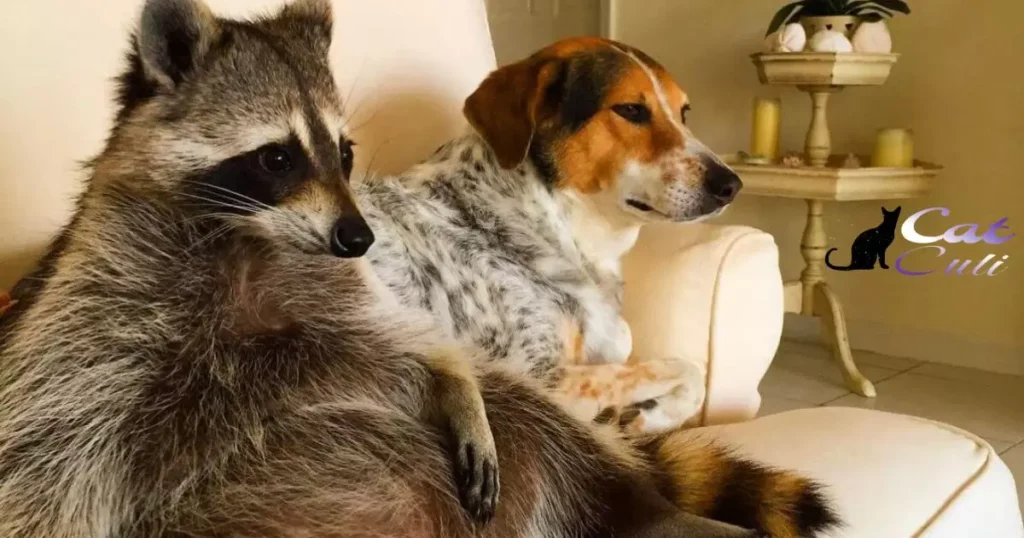
Discovering the best diet for a pet raccoon is essential for their health and happiness. Raccoons thrive on a varied menu that includes fruits, vegetables, and lean proteins. Avoiding excessive processed foods and offering a balanced, nutritious diet ensures your pet raccoon receives the proper nutrients for a vibrant and active life.
When planning the ideal diet, consider consulting with a veterinarian to tailor the nutrition to your raccoon’s specific needs. Incorporate a mix of high-quality commercial raccoon food, supplemented with fresh, wholesome ingredients.
By providing a well-rounded and carefully curated diet, you can contribute to the well-being of your pet raccoon and strengthen the bond between you and your furry companion.
What Food Does A Wild Raccoon Eat?
Wild raccoons have a diverse diet, eating both plant and animal matter. They’re opportunistic feeders, consuming fruits, nuts, insects, small mammals, and even scavenging from human waste. This adaptability enables them to thrive in various environments.
Their omnivorous nature means wild raccoons are resourceful, seeking out a mix of protein and carbohydrates. Their diet changes with the seasons, reflecting the availability of different food sources. Understanding the varied diet of wild raccoons sheds light on their resilience and ability to adapt to their surroundings.
What Food Does A Pet Raccoon Eat?
Curious about what food a pet raccoon eats? Pet raccoons thrive on a balanced diet consisting of fruits, vegetables, and lean proteins. Offering a mix of high-quality commercial raccoon food and fresh, natural ingredients ensures they receive the essential nutrients for a happy and healthy life.
Avoid feeding your pet raccoon processed or high-sugar foods. Opt for a varied diet, replicating their natural foraging habits, to keep these intelligent animals engaged and well-nourished. Understanding their dietary needs is key to providing the best care for your pet raccoon.
How Much Food Does A Pet Raccoon Eat?
Pet raccoons eat varying amounts based on factors like age, size, and activity level. On average, an adult raccoon consumes about a cup of high-quality commercial raccoon food daily, complemented by fresh fruits, vegetables, and protein sources. It’s essential to monitor their weight and adjust portions accordingly to ensure a healthy, well-balanced diet for these charming companions.
Younger raccoons require more frequent feeding, typically three to four times a day. As they grow, transitioning to two meals daily suffices. Keeping a close eye on their dietary needs and adjusting portions as they age ensures your pet raccoon stays happy and maintains optimal health.
Does A Raccoon Eat Food Out Of A Bowl?
Curious if raccoons eat from bowls? Absolutely! Raccoons are known scavengers and opportunistic eaters. They won’t hesitate to explore a bowl left outside, especially if it contains pet food. Their adaptability and resourcefulness make them adept at finding and enjoying food in various containers.
When it comes to raccoons and bowls, it’s not just about pet food. These clever critters may investigate any bowl left unattended, whether it’s leftovers or outdoor dining remnants. Their inquisitive nature and love for exploration mean that if there’s food in a bowl, a raccoon is likely to give it a thorough inspection.
More From The Spruce Pets
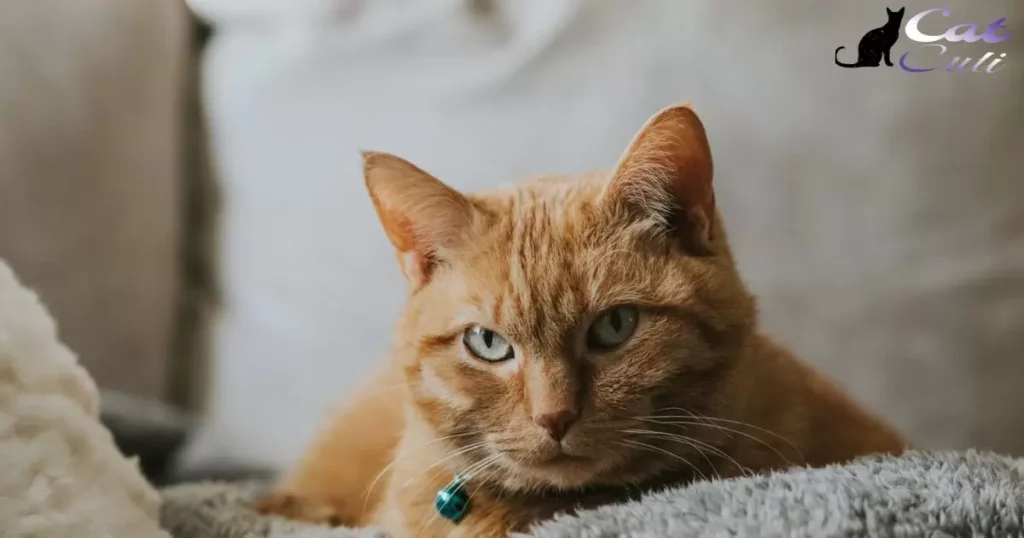
Explore a wealth of pet care advice and tips with More From The Spruce Pets. Discover practical insights into feeding, grooming, and nurturing your furry friends. Whether you’re a seasoned pet owner or a newcomer, find valuable information to ensure the well-being and happiness of your beloved companions.
Delve into a variety of articles on The Spruce Pets, covering everything from choosing the right pet food to creating a comfortable living space for your pets. With straightforward guidance and helpful suggestions, enhance your pet care knowledge and foster a strong and loving bond with your animal companions.
What Happens If You Quit Feeding Raccoons
When you stop feeding raccoons, they’ll naturally seek alternative food sources. These resourceful creatures may explore different areas, adapting to changes in their environment. Without a dependable food source, raccoons might become more active in their search for sustenance, showcasing their natural instincts.
Raccoons accustomed to regular feeding may face challenges when the food supply abruptly stops. They may exhibit increased foraging behaviour, showcasing their adaptability. Observing these behaviours can provide insights into raccoon resilience when faced with changes in their food availability.
Is Feeding Raccoons Illegal
Feeding raccoons can be illegal in some areas. Authorities enact laws to discourage human interference with wildlife. Such regulations aim to maintain a balance in ecosystems and prevent potential harm to both animals and people.
Always check local guidelines to ensure you are in compliance and promoting the well-being of raccoons and the environment.It’s important to recognize that feeding raccoons may lead to unintended consequences.
By refraining from providing them with food, we allow these wild creatures to follow their natural instincts, promoting a healthier coexistence between humans and wildlife. Understanding and respecting local regulations helps in fostering a harmonious relationship with the wildlife that shares our surroundings.
Best Dog Food For Raccoons
Looking for the best dog food for raccoons? Opt for high-quality dog food with a balanced blend of proteins, fats, and carbohydrates. Ensure it contains essential nutrients like fruits and vegetables, meeting the dietary needs of raccoons for a healthy and happy life.
Avoid cheap or low-quality options, as they may lack vital nutrients. Choose a reputable dog food brand with a well-rounded nutritional profile to provide the best sustenance for our furry friends, promoting their overall well-being and vitality.
Is Cat Food Or Dog Food Better For Raccoons?
When deciding between cat food or dog food for raccoons, consider their specific nutritional needs. Cat food tends to be more suitable due to its higher protein content, resembling the raccoon’s natural diet.
Dog food, on the other hand, may lack essential nutrients required for raccoon health. Opting for cat food ensures a closer match to their dietary requirements and supports their overall well-being.
Providing raccoons with a balanced diet is essential. Cat food offers a better nutritional profile for these curious creatures, ensuring they receive the necessary nutrients for a thriving and healthy life.
What Can Raccoons Not Eat
Raccoons should avoid certain foods to stay healthy. They cannot eat chocolate, as it contains substances harmful to them. Onions and garlic are off the menu for raccoons, as these can lead to digestive issues. It’s important to be aware of these restrictions to ensure our furry friends enjoy a diet that keeps them safe and thriving.
Foods like grapes and raisins are also on the list of items raccoons should not consume. These can cause kidney damage and should be kept away from their diet. Being mindful of what raccoons cannot eat helps create a secure environment for them and promotes their well-being in the wild.
Cheapest Food For Raccoons
Raccoons are resourceful creatures, and when it comes to their diet, finding the cheapest food options can be practical. Opting for a mix of fruits, vegetables, and grains can provide a budget-friendly yet nutritionally balanced diet for these clever animals. By choosing wisely, you can ensure raccoons get the sustenance they need without breaking the bank.
Inexpensive options like leftover fruits and vegetables or unsalted nuts can make up a significant part of a raccoon’s diet. Being mindful of cost doesn’t mean compromising on their nutritional requirements. With a bit of creativity, you can offer affordable and wholesome meals that keep raccoons thriving in urban or wild settings.
Neighbour Is Feeding Raccoons
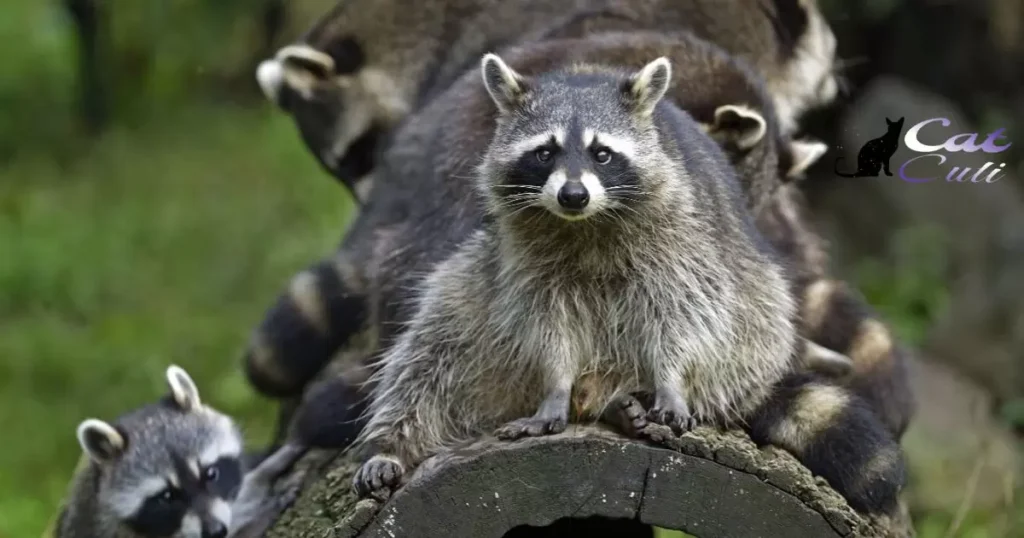
My neighbour feeds raccoons regularly. They leave food out for the clever creatures, attracting them to the area. This practice can create a bond between humans and raccoons but may also have consequences for the neighbourhood ecosystem.
Feeding raccoons can lead to increased raccoon visits and alter their natural behaviour. It may also cause dependency on human-provided food, impacting their ability to forage for themselves. While the intention might be friendly, it’s essential to consider the potential effects on both the raccoons and the local environment.
FAQ’s
Should you feed raccoons cat food?
Feeding raccoons cat food is not recommended. It lacks essential nutrients crucial for their health and may disrupt their natural diet.
What food is toxic to raccoons?
Raccoons should avoid grapes, chocolate, and caffeine. These can be toxic, causing harm to their digestive and nervous systems.
How do I stop raccoons from eating my cat food?
Secure trash bins, use raccoon-proof containers, and feed pets indoors. These measures discourage raccoons from accessing and consuming cat food.
Why should you not feed raccoons?
Feeding raccoons can lead to dependency, disrupt their natural foraging behaviour, and cause issues in the local ecosystem. It’s best to let them find their own food.
Conclusion
In conclusion, the question Is Cat Food Bad For Raccoons? prompts us to rethink our choices when it comes to feeding these clever creatures. Cat food, while convenient, falls short of meeting the nutritional needs of raccoons, lacking essential elements for their well-being.
By steering clear of cat food and opting for a more balanced and varied diet, we contribute to the overall welfare of these fascinating animals. So, the next time the question arises, consider the well-being of raccoons and provide them with the nutrition they need for a happy and healthy life.
